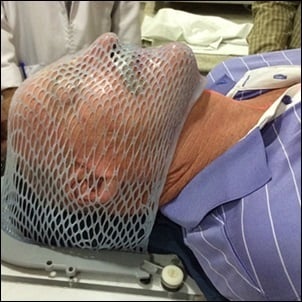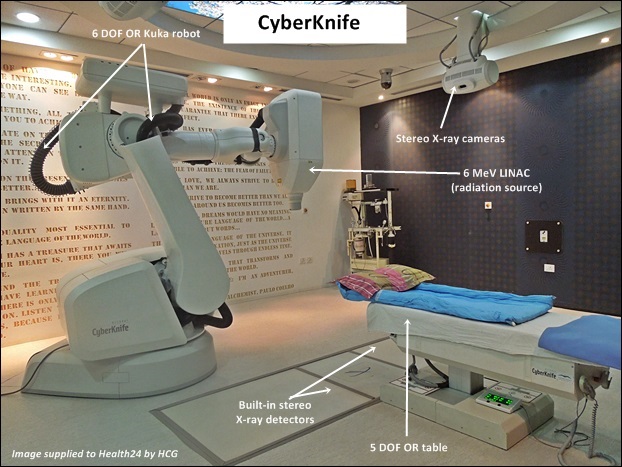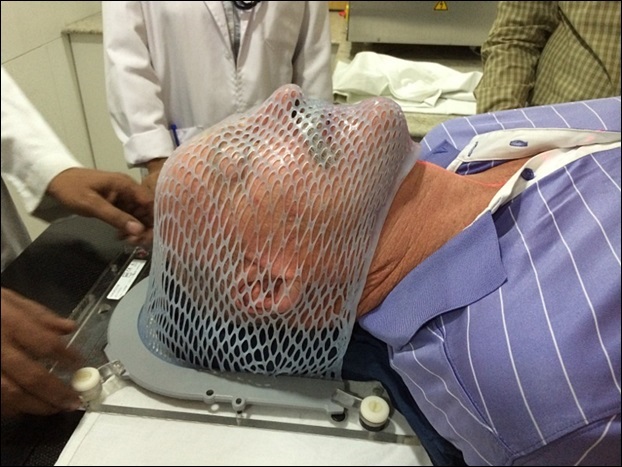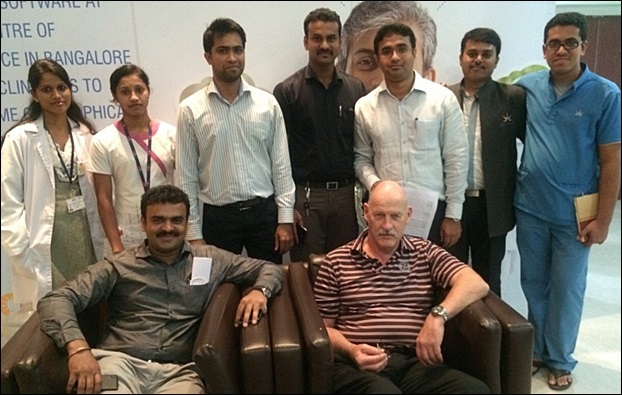
With his head bolted back and a mask covering his face to keep him still, a deadly silence pervaded as legendary cricket all-rounder Clive Rice set about his first treatment session in his battle against brain cancer.
A neurosurgeon in South Africa told him his tumour was inoperable after brain scans showed that the cancerous tumour in the centre of his brain was too deep to be removed.
Fighting for his life, he faced a race against time as he travelled all the way to Bangalore in India for pioneering laser treatment called CyberKnife.
'I was just going to die'
"If I stayed I was just going to die. The tumour would have grown and that would be that," Rice told Health24.
The name CyberKnife may conjure up images of invasive surgery; however, the procedure actually involves an advanced form of robotic radio surgery where no cutting takes place.
"It saved my life and I hope that spreading the word will help other people," Rice said.
He underwent one hour sessions of intense doses of radiation for three days at the Health Care Global Hospital (HCG) under the guidance of renowned radiation oncologist Dr Sridhar.
Before the treatment started, several tests had to be done."On arrival at the hospital they did various tests." These included:
- A Computerised Tomography (CT) scan, which combines a series of X-ray images taken from different angles and uses computer processing to create cross-sectional images, or slices, of the bones, blood vessels and soft tissues inside the body.
- A Magnetic Resonance Imaging (MRI) scan, which uses strong magnetic fields and radio waves to produce detailed images of the inside of the body.
- A Positron Emission Tomography (PET) scan to produce detailed three-dimensional images of Rice's body. It is much more complicated than the CT and MRI as it can also show functions of body organs and tissue. It is often used to diagnose a condition or to see how a condition is developing.
Rice said following the tests a team of doctors discussed the treatment and then started one hour sessions of CyberKnife radiation for three days.
What CyberKnife entails
Dr Sridhar explained to Health24 the processes involved in CyberKnife treatment that was used to target Rice's tumour.
CyberKnife works by sending multiple beams of high dose radiation in a variety of angles using a robotic arm with high precision. "This accuracy enables tumours to be treated that are in difficult or dangerous positions such as near the brain or spinal cord."
He said that CyberKnife also uses real-time image guidance software to continually track and adjust for movement during treatment. "This allows the patient to breathe easily and stay relaxed throughout the procedure."
Furthermore, X-ray cameras monitor the patient’s breathing and re-position the radiotherapy beam in order to minimise damage to healthy tissue, said Dr Sridhar.

Full view of a CyberKnife machine (Image: HCG)
Are there side effects?
Dr Sridhar said since CyberKnife targets only the affected areas with a high degree of precision, there is minimum exposure of healthy cells to radiation. "The intensity of each individual beam isn't high. However, combined energy of the beams target the cancerous tissue with the least possible effect on healthy organs. This minimises side effects."
It was quiet in the room, Rice said about his first session. "I could hear the machine going around to different angles and I was pleased to start some positive treatment. The following days they played some music for me which broke the silence."

A mask was used to bolt Clive Rice to the table of the Robotic CyberKnife machine. (Image: Supplied by Clive Rice)
Clive's wife, Susan, who accompanied him to Bangalore, told Health24 she was in a "mild panic" ahead of the trip and could only finally breathe a sigh of relief when the treatment started. "I felt hugely relieved when they could do the treatment."
Susan was allowed to see a bit of the first treatment and then spent her time in the canteen or waiting room. "It is radiation so they do not want people around," she explained.
She also shared her deepest anxieties with Health24. "I think the most anxious time was making sure we got Clive to India with such a lot of flying. I would often look at him and just feel 'is this really happening to such a strong person'."
For Susan, the panic only subsided after the trip, as she pointed out that "coming home was very much a relief".

Dr Sridhar (left) seated next to Clive Rice, and his team of doctors. (Image: Supplied by Clive Rice)
Asked about his overall experience at HCG, Rice answered with a simple "truly amazing". He explained further: "Dr Sridhar and his team were really fantastic. Very friendly, professional and kept me informed all the way. I could ask any questions and he was happy to answer.
"The hospital fetched us from the airport, took us to and from the hospital for treatments and dropped us back at the airport," he said.
Rice said CyberKnife radiation will have killed the tumour, although he added: "It will take time for the matter to leave the brain area due to slow drainage."
He said he has to take tablets to prevent any seizures and will return to India for a check up in the next three months.
CyberKnife surgery in India, which has the most advanced CyberKnife Radio Surgery System in Asia Pacific, is offered at a greatly reduced costs compared to the US. This sees HCG receiving patients from the world over. Dr Sridhar could not tell Health24 what people can expect to pay for CyberKnife treatment. "It depends on the patient’s condition and on the various fractions provided for different cases."
To learn more about CyberKnife click here:
CyberKnife - HCG's newest technology for cancer treatment – HCG EnterprisesWhat's available in South Africa
Professor Jeannette Parkes, head of the Clinical Unit at the Department of Radiation Oncology at Groote Schuur Hospital and associate professor at the University of Cape Town, told Health24 that radio surgery is available in South Africa. "There are radio surgery units in Johannesburg, Pretoria, Durban and Cape Town."
The commonest indications for treating with radio surgery include acoustic neuroma, arteriovenous malformations, meningiomas not amenable to surgery, pituitary tumours, paragangliomas of the skullbase, brain metastases and other small lesions not amenable to surgery.
Parkes said radio surgery can be performed using several different types of machines, including gamma knife, linear accelerator, proton therapy and CyberKnife.
"For the indication of treating small, benign but deep intracranial lesions, there is no evidence that any one technique is superior to any other."
Parkes pointed out that CyberKnife and Gamma knife are not available in the country, but said both linear accelerator-based radiosurgery and proton based radio surgery are. It is available in both the state and private sectors.
Dr Sridhar said he would encourage South Africa to introduce CyberKnife treatment. "It not only helps the clinicians but it also offers hope to cancer patients with tumours which are otherwise inoperable due to their proximity to major blood vessels or sensitive organs. It can be used for a range of cancers, including CNS, prostate, pancreas, liver, lung and bone and benign disease as well."
A shocking discovery
Another South African who travelled to HCG was Greg Fuchsloch. He was diagnosed with prostate cancer in 2014 and following the treatment and follow-up check up no traces of cancer were found in his body.
His wife Karin told Health24 she went with her husband to Bangalore and was shocked when doctors at HCG discovered she too was in dire need of life saving surgery. "If we had not heard about CyberKnife, and if Greg had not decided on Dr Sridhar, I might have been dead now!"
She said the doctors went above and beyond what they had expected. "We left the hospital, and Bangalore, feeling like family."
Health24 will bring you her full story.
Read more:
SA should get CyberKnife, says Dr Sridhar
Why Clive Rice is going to Bangalore for brain cancer treatment
Radiofrequency ablation shows promise for inoperable lung cancer
Young brain cancer sufferer ends life with dignity
Aspirin can slow non-cancerous brain tumours
Can cellphones cause brain cancer




 Publications
Publications
 Partners
Partners











